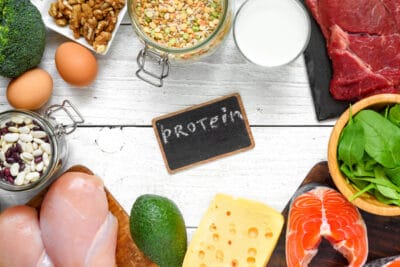With so much information out there, it can be hard to know how much protein you really need, what counts as a high-quality source, and how dairy compares to alternatives like almond or oat beverages.
That’s where our dairy protein fequently asked questions comes in.
We’ve gathered some of the most common questions about protein and answered them with clear, science-backed insights. From daily needs and complete proteins to the role of dairy in fueling every stage of life, you’ll find practical information to help you make confident, nutritious choices.
One 8-ounce glass of milk provides 8 grams of high-quality protein. That’s the same whether you choose whole, 2%, 1%, or fat-free milk, the protein content stays consistent across varieties. Milk protein is considered “complete,” meaning it contains all nine essential amino acids your body needs but can’t produce on its own.
High-protein, or ultrafiltered, milk is packed with complete protein, which means it has all the essential building blocks your body needs to stay strong and healthy. Thanks to the ultrafiltration process, the protein concentration in this milk is significantly higher, typically around 13 grams per cup while lactose and sugar levels are reduced. The protein in milk is a mix of whey and casein, which digest at different rates: whey is absorbed quickly, supporting muscle recovery after exercise, while casein digests more slowly, helping maintain satiety and steady amino acid availability. This combination makes high-protein milk a valuable option for people looking to build or preserve lean muscle, manage hunger, and support long-term health, all in a nutrient-dense, convenient beverage.
Protein content varies depending on the dairy product and brand. Here’s a quick look at common options:
- High-Protein Milk: 13 grams per 8 oz
- Milk: 8 grams per 8 oz
- Yogurt: 8 grams per 6 oz
- Greek yogurt: 15–20 grams per 6 oz
- Cottage cheese: 12–14 grams per ½ cup
- Cheddar cheese: 7 grams per 1 oz
Yes. Dairy protein is considered a complete protein, meaning it contains all nine essential amino acids that the body cannot produce on its own. These amino acids are necessary for building and repairing muscle tissue, supporting immune function, and maintaining overall health. Both whey and casein, the two proteins found in milk, are complete, high-quality proteins with high digestibility and excellent bioavailability.
No. Most plant-based alternative milks, including almond milk and oat milk, do not contain complete protein. These beverages offer lower amounts of protein, typically 1 gram per serving for almond milk and 3 grams for oat milk, and they do not provide all nine essential amino acids in the proportions the body needs.
*compares milk with the leading brand of plant-based milk
Whey and casein are the two types of protein found naturally in milk.
- Whey protein is fast-digesting and quickly delivers amino acids to your muscles, making it ideal for recovery after physical activity.
- Casein protein digests more slowly, providing a steady release of amino acids over time. It’s helpful for sustaining fullness and supporting overnight recovery.
Both are complete proteins, and together, they make milk a uniquely effective option for fueling and recovery.
Yes! Protein plays a vital role in supporting sustained energy by contributing to muscle health, tissue repair, and satiety. Milk provides a balance of protein, carbohydrates, and electrolytes that can help keep you feeling strong and energized throughout the day.
| Milk | 8 grams |
| Almond Milk | 1 gram |
| Oat Milk | 3 grams |
*compares milk with the leading brand of plant-based milk
Yes. Many people with lactose intolerance can still enjoy certain dairy products. Options like hard cheeses, yogurt, and lactose-free milk are typically well-tolerated and still provide the same high-quality protein as regular dairy.
Children and teens need less in total, but more in proportion to their smaller bodies, since they’re growing.
Active individuals, athletes, older adults, and people recovering from illness often benefit from higher protein intakes, closer to 1.2–2.0 g/kg/day, to support muscle repair, strength, and healthy aging.
The recommended daily intake for protein varies based on age, activity level, and life stage and is based on the minimum amount needed to prevent deficiency not necessarily the amount that’s optimal for health, strength, or performance.
In general:
- Adults need about 0.8 grams per kilogram of body weight. For example, 150 pound person, needs about 55 grams of protein per day, and a 200-pound person needs about 72 grams of protein per day.
- Active individuals and athletes may need more protein—up to 1.2-2.0 grams per kilograms of body weight per day.
- Older adults benefit from spreading protein intake throughout the day to maintain muscle and mobility.
Incorporating dairy into your diet makes it easier to meet these needs with high-quality protein sources.
Yes. As we age, we naturally lose muscle mass, which can affect balance, strength, and independence. Including high-quality protein from milk, yogurt, and cheese in your daily routine can help preserve lean muscle and support mobility. Dairy is also rich in calcium, vitamin D, and other nutrients important for aging well.
Yes. Chocolate milk contains a combination of protein, carbohydrates, and electrolytes, which makes it an effective post-workout option. It has been studied for its ability to support muscle recovery, replenish glycogen stores, and promote hydration.


